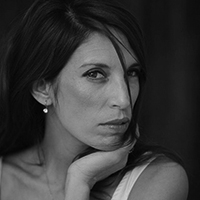TEL AVIV — The most powerful woman in Israel’s ruling Likud party has just moved into a trailer. Knesset member Miri Regev, the party’s attack dog and the closest thing Israel has to Sarah Palin, boarded the mobile home—attached to an Audi SUV—last week ready to crisscross the country campaigning for Prime Minister Benjamin Netanyahu, a man who never wanted her to be the face of the party to so many Israelis.
She admits that the trailer, decorated with the Likud’s blue colors and emblazoned with her face, is a gimmick, but it’s one that fits her well. She is, after all, the queen of media stunts—and a frequent object of mockery by Israeli journalists and satirists.
“We’re going from place to place all over the country, we’ll be meeting and talking to people at the markets, the malls, on the street,” she said to a group of journalists who gathered to see her off outside her home in Rosh Ha’ayin.
“The greatest thing about this is that nothing is planned,” she said, then added without any apparent sense of contradiction, “We only planned the stops we’ll be making.”
Regev is one of the only Israeli politicians who could pull off such a stunt. The soon-to-be-50-year-old mother of three, fifth on the Likud list, is an outspoken politician who embodies a flag-waving, gung-ho brand of Zionism, and a folksy, sneering attitude towards the Israeli Left and the country’s media elites.
Regev’s style and her growing popularity are emblematic of the Likud’s—and the general public’s—strong shift to the right in recent years, a shift that has allowed a level of animosity toward the Left many say has not been seen since the tense days before the assassination of Prime Minister Yitzhak Rabin in 1995. As the Israeli national elections approach next month, the party has upped the ante, releasing a campaign video charging that the Left would allow the Islamic State (ISIS) into Israel, sharpening the Likud’s “us or them” approach in this divisive political climate.
Regev often takes up that message on her Facebook and Twitter pages, engaging in the Left-bashing of “hegemonic anti-Zionists” she insinuates are hell-bent on giving away Israeli land.
Recent polls have given the Likud 24-25 seats in parliament, putting it neck-and-neck with the center-left Zionist Union party, led by Labor’s Isaac Herzog and Hatnua head Tzipi Livni, a staunch supporter of a peace deal and a former chief negotiator with the Palestinians.
Regev does not conceal her disdain for Livni and her efforts, calling her a dishonest, unpatriotic, unaccomplished politician with no influence over any important matters.
On a sunny January morning when we met her, Regev sat on her living room couch in her home and displayed even less patience with talk of a diplomatic solution to the Israeli-Palestinian conflict.
“I want the whole world to stop engaging in a ‘see no evil, hear no evil, speak no evil’ act,” she argues. “Leave the fantasies of peace alone at the moment, because the Palestinians don't want peace, they want Israel, all of it. The Palestinians don’t want peace with us. And if they do, they should start with Gaza.”
When pushed on why Israel and the Likud have not done more to come to an agreement with the Palestinians over the past six years in power, she becomes agitated and combative, scooting to the edge of her seat.
“You, you precisely are in the service of Abu Mazen [Palestinan Authority President Mahmoud Abbas]. With your questions. There is no peace with the Palestinians. It's all an illusion,” she says with contempt.
Regev sounds almost exactly like Netanyahu’s biggest political rival, Naftali Bennett, the even more right-wing, nationalist, pro-settler leader of the Jewish Home faction. While Bennett openly calls for the annexation of the West Bank, Regev charges that a Palestinian state already exists—in the Gaza Strip—and fiercely rejects the internationally condemned fact that the Palestinian enclave there is under a strict blockade. Regev maintains that if Gazans had wanted, the enclave could have become like the Cote D’Azur, the French Riviera.
With considerable derision, she dismisses the land-for-peace formula, arguing that “a secure future doesn't mean giving more and more and more parts of Israel.”
“We disengaged [from Gaza in 2005]. We uprooted Jews from their homes, We gave it to the Palestinians. What did they do with it? Terror, and more terror and more terror. You want that to happen here [in central Israel]?” she demands.
Blasting the “bleeding-heart leftists” who support land concessions in any future peace deal, Regev promises “not to let anyone kill Israeli citizens.”
“We are the saviors of the Palestinians,” she says, the irony lost on her. “We continue giving them electricity and water and every humanitarian assistance available.”
With a shake of her head and a flick of her hand, she disregards a reminder that living conditions in the Gaza Strip have been compared to an open-air prison, and blames those same Palestinians living under the Islamist rule of Hamas for their circumstances.
“Oh, they’re suffering? Why did they choose Hamas?” she demands, in a sentiment often heard among Israelis, especially during last summer’s war between Israel and Hamas.
Regev is unperturbed by non-Israeli suffering, championing issues that, she says, are important to the average Israeli. She portrays herself as a traditional, working Jewish matron rooted in middle- and lower-class concerns, having grown up in what is known as the Israeli periphery.
The daughter of parents who immigrated to Israel from Morocco, and who made their home in the dusty southern Israeli town of Kiryat Gat, the military offered an opportunity to advance that otherwise might not have been available to someone of her background. As such, she portrays herself as the antithesis of Israelis from the elite coastal enclaves in and around Tel Aviv.
Regev joined the Israel Defense Forces at age 18 and stayed for 25 years, reaching the rank of brigadier general. She first came to the public’s attention when she served as the spokesperson for the IDF from 2005 to 2007, most notably during the Second Lebanon War in 2006.
She then joined the Likud party in 2008 but only reached 27th place in the 2009 party primaries. In December last year, she catapulted to the fifth slot, solidifying her place as one of the most important women in Israeli politics.
Over her seven-year political career, she’s gained notoriety as a firebrand. She’s a vehemently anti-immigrant member of parliament who in 2012 called Israel’s African migrant community a “cancer in our body,” later apologizing—to cancer survivors. She is a nationalist who accused Arab members of parliament of being a fifth column; a staunch conservative who strongly opposes a two-state solution to the Israeli-Palestinian conflict; and a Bible-quoting Jewish woman who supports same-sex marriage.
It was to Netanyahu’s dismay that Regev placed just four spots below him, especially considering how much he is reported to have maneuvered behind the scenes to keep her from reaching the top of the list. Perched that high, Regev is all but guaranteed a senior ministerial position should Netanyahu win a fourth term on March 17, when Israelis go to the polls for the second time in two years.
It is a rarified position for a woman most known for her over-the-top nationalism. Besides her xenophobic statements on African migrants, the would-be minister may be best known for a bizarre incident in which she paraded around the stage at an appearance with other politicians at an Israeli high school, waving the blue-and-white Israeli flag above her head, calling for applause, her own personal hype-man working the crowd as she ridiculed politicians from rival parties. She’s also announced on Israeli TV that she was “happy to be a fascist,” following criticism that her views on foreigners were totalitarian.
She is notoriously aggressive and passionate when arguing, easily capable of talking over her opponent, with facts often an obstacle to be ignored. She shouts and waves her hands, and is most often referred to as being “schuna”—Hebrew slang for someone from the street, or trashy. Regev has embraced the role, and has claimed the “schuna” tag as a badge of honor.
Love or loathe her—and few people in Israel are indifferent to the Regev spectacle—there is no denying the fact that Regev is a talented politician who, despite her image as a pushy, ignorant figure, has paved her way shrewdly and confidently to the top of the country’s male-dominated ruling party, where the next woman on the party list is only at the 14th spot.
She has put in great effort, working the old boys’ network, courting Likud members and delegates of the Likud committee, attending weddings and other special occasions, speaking at rallies, and generally being an in-the-field politician, accessible and friendly.
When discussing her political career and ambitions, Regev is clear and serious, unfazed by her party chairman’s dislike for her. In fact, she’s openly challenged him following her victory, threatening a “coup” if not given a senior post.
“Netanyahu will respect the voters’ wishes,” she says more calmly during our interview.
It is no secret that he regards her as a member of the internal opposition, someone who rooted for Gideon Sa’ar, a popular ex-Likud minister and a Netanyahu rival, during the party primaries. Sa’ar had bowed out of politics last year, but considered a comeback when early elections were called.
When asked about this, Regev doesn’t skip a beat, denying that she supported Sa’ar and stating confidently that Netanyahu will be the next prime minister and she will help him win, positioning herself for even more political influence within her party and within the government.
Regev has already picked her ministry of choice—the Housing and Construction Ministry, which she says will allow her to “build up the land of Israel,” and no doubt advance housing in West Bank settlements, endeavors that are likely to curry favor with that voting bloc of nationalists with whom she shares many views. These same endeavors would be certain to invite the dismay and outrage of the international community, whose views she doesn’t share, to say the least.
Whatever role she’ll play in the next government, Regev is certain to continue gaining notoriety, and will remain the sort of divisive and outrageous figure the media and a large portion of the voting public can’t get enough of. And while it’s easy to dismiss her populist antics and aw-shucks style as nothing more than a cheap spectacle, she is no fool and to be underestimated at one’s own peril.
Just ask Bibi.





